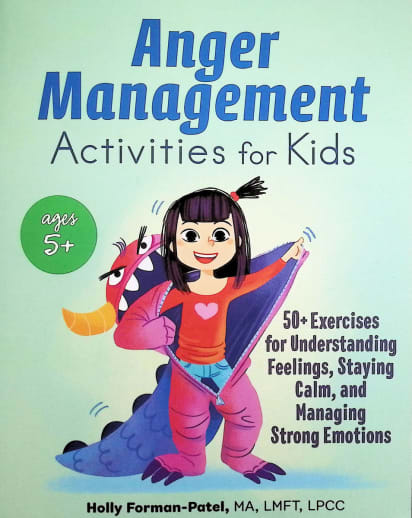Anger is a nature response that we all feel, and children need to be taught how to navigate this emotion. Just telling a child to “stop it” doesn’t actually help them process what is happening inside. This book has some helpful ways to guide your child through the process by using seven real scenarios that springboard into activities to break the scenario down and demonstrate how they can handle similar situations in their own lives. Some activities include cognitive behavioral therapy, mindfulness, eye movement desensitization and reprocess therapy (EMDR), and play therapy. This book provides support for everyday anger, anger responses to trauma, developmental disorders, and other underlying issues. Please note that if any of these issues are greatly impacting a child, individual or family therapy might be more helpful to seek out. 107 pgs, sc. ~Amber
Anger Management Activities for Kids
SKU
047864
ISBN
9781646116294
Grade K-3
These icons are designed to help you quickly understand and learn important information about our products.
Teaching Method
Traditional
Teacher-centered curriculum commonly used in classrooms that may include a text, teacher manual, tests, etc.
Charlotte Mason
A methodology based on the work of a 19th century educator who maintained that children learn best from literature (Living Books), not textbooks.
Classical
A methodology based on the Latin Trivium (three stages of learning), including the grammar stage (memorization and facts), logic stage (critical thinking), and rhetoric stage (developing/defending ideas).
Unit Study
A thematic or topical approach centered around one topic that integrates multiple subject areas.
Montessori (Discovery)
A methodology based on the work of a 20th century educator that emphasizes student and sensory-driven discovery learning and real-life applications.
Other
Other methodologies
Religious Content
Secular
Contains content contrary to common Christian beliefs (i.e. evolution).
Neutral
Avoids religious or theoretical topics or presents multiple viewpoints without preference.
Christian/Religious
Faith-based or including instructional religious content.
Learning Modality
Auditory
Learns through listening, talking out loud or reading out loud.
Visual
Learns through seeing, prefers written instructions and visual materials.
Kinesthetic/Tactile (Hands-On)
Learns through moving, doing and touching.
Multi-Sensory
Curriculum that employ a variety of activities/components.
Presentation
Sequential
Curriculum progresses through well-defined learning objectives. Emphasizes mastery before moving to the next topic.
Spiral
Topics and concepts are repeated from level to level, adding more depth at each pass and connecting with review.
Conceptual/Topical
Focus is on the “why,” often with a unifying concept as well as specific skills; coverage may be broader.
Teacher Involvement
Low Teacher Involvement
Student-led materials; parent acts as a facilitator.
Medium Teacher Involvement
A mix of teacher-led time and independent student work.
High Teacher Involvement
Teacher-led lessons; may utilize discussions, hands-on activities and working together.
Additional Materials Required
No other materials needed
Everything you need is included.
Other Materials Required
There are additional required resources that are a separate purchase.
Other Materials Optional
There are additional resources mentioned or recommended but are not absolutely necessary.
Consumable
Consumable
Designed to be written in; not reusable.
Non-Consumable
Not designed to be written in; reusable.
Our Price
$15.99 $15.99 $11.95
Rainbow Savings: $4.04
Product Overview
- 50+ fun activities to help kids learn to manage anger
- Written by a licensed marriage and family therapist and licensed professional clinical counselor
- Learn how to understand feelings, stay calm, and manage strong emotions
- Focuses on social-emotional development
Description
Publisher's Description of Anger Management Activities for Kids
Everyone gets angry, and that's OK―it's how you express your angry feelings that really matters. Anger Management Activities for Kids is filled with more than 50 engaging exercises to help you understand and manage your anger so you can express yourself safely, without hurting others or yourself.
Discover enjoyable activities that illustrate where anger comes from, what it feels like, how to show your feelings, how to tame your temper, and even how to understand and help other people when they're angry. With this workbook about anger management for kids, you'll use your imagination, have fun, and get creative as you learn how to show your anger who's boss!
Details
| Product Format: | Paperback |
|---|---|
| Grades: | K-3 |
| Brand: | Callisto Kids |
| ISBN: | 9781646116294 |
| Length in Inches: | 9.25 |
| Width in Inches: | 7.5 |
| Height in Inches: | 0.375 |
| Weight in Pounds: | 0.7 |
Videos
Reviews

